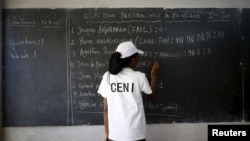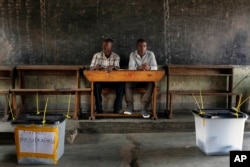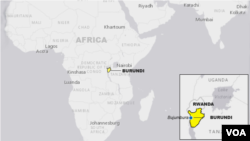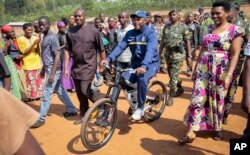Votes were being counted Wednesday in Burundi, a day after a controversial presidential election was marred by pre-election violence that has led thousands of people to flee the country over the past few months.
Results from the polls, which were condemned as illegitimate by the international community, are expected Thursday.
The presidential election Tuesday is believed to have had low turnout, as President Pierre Nkurunziza ran without significant opposition for a third term.
But electoral commission head Pierre-Claver Ndayicariye told The Associated Press Wednesday that between 72 and 80 percent of Burundi's 3.8 million voters cast their ballots.
Former president
In an interview with VOA, former Burundi President Domicien Ndayizeye said opposition parties will not recognize the election results and neither should anyone else.
"There is not enough participation of the other political parties. That is why we say and we ask the international community not to recognize these elections and to go on pressuring the current government, the ruling party so that we agree to organize free and fair elections which will be credible and which will bring peace and stability for all," Ndayizeye told VOA.
The elections have been roundly criticized as not free or fair, after the government ignored an opposition boycott and calls from the international community to postpone the election due to the unrest.
Since the president announced he would seek a third term in April, Burundi has experienced three months of street protests, a failed coup attempt, and more than 170,000 people fleeing to nearby countries.
Ndayizeye said the government did not help matters by ignoring the protests and using intimidation against opponents.
Anti-Nkurunziza protests have been violently repressed, leaving at least 100 people dead since late April.
In a night of gunfire and explosions before the election, government officials reported at least three people dead -- two policemen and an opposition official.
Third term
Critics say Nkurunziza should not be allowed to serve a third term, but Burundi's constitutional court ruled he is eligible because he was chosen by lawmakers rather than voters for his first term in 2005.
The U.S. State Department said Tuesday that by going ahead with the election, Burundi's government could lose legitimacy in the eyes of its people and unravel the Arusha Agreement that ended the country's civil war.
It warned the U.S. will review all aspects of the U.S.-Burundi relationship not yet suspended, and may impose visa restrictions on those who promote violence.
United Nations Secretary-General Ban Ki-moon called on authorities to "ensure security and a peaceful atmosphere during the election" and for all parties in Burundi to resume dialogue.
U.N. advisers monitored Tuesday's vote.
The U.S. also said it is "deeply concerned" that Burundi's foreign minister failed to approve entry for African Union human rights monitors ahead of the election.
The presidential election follows a parliamentary vote last month that Nkurunziza's party easily won. The opposition also boycotted that vote, which was also criticized internationally for not being free or fair.
Opposition candidates have expressed the same about the presidential election, saying widespread intimidation and the threat of violence prevent the country from holding a fair vote.
Mohammed Yusuf contributed to this report from Bujumbura. Some material for this report came from AP, AFP and Reuters.








